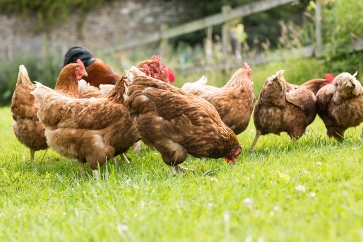| Virulent Newcastle Disease |
Virulent
Newcastle Disease (VND) detected in
Los Angeles County (2018-2020)

 California Free of Virulent Newcastle Disease - Southern
California Regional Quarantine Lifted - California
Department of Food and Agriculture (CDFA)
6.1.20
California Free of Virulent Newcastle Disease - Southern
California Regional Quarantine Lifted - California
Department of Food and Agriculture (CDFA)
6.1.20
As of June 1, 2020 - State and federal regulatory agencies
have declared an end to the VND quarantine in Southern
California. Extensive testing of the regulated areas
has been completed and no additional cases have been
detected. This allows poultry to again move freely in
California.
To continue to protect California flocks,
poultry entering California must either have a certificate
of veterinary inspection demonstrating good health or a
National Poultry Improvement Plan certificate.
All backyard poultry owners and
commercial operations are encouraged to learn about and
practice biosecurity measures, to routinely check birds for
signs of illness, and to report suspected VND or other bird
diseases.
Learn more about
Virulent Newcastle Disease - CDFA
Learn more about
biosecurity for poultry (Defend The Flock) - USDA
Background
VND was first detected in May 2018 in Los
Angeles County. By December 2018 the virus had spread
extensively in backyard poultry in the LA Basin and in
commercial flocks in neighboring counties. After
prolonged disease control efforts, the last confirmed
positive case was detected in February 2020. Testing
continued throughout the area since that time to gain
assurance that the disease was eradicated.
All bird owners and veterinarians are
advised to learn about VND, and how to protect birds.
It is important to note that VND is not a food safety
concern. Properly cooked poultry products are safe to eat.
What is Virulent
Newcastle Disease (VND)?
Virulent Newcastle Disease (aka VND,
Exotic Newcastle Disease, END) is caused by a highly
contagious virus that can infect poultry and many other
species of birds, including parrots. It can cause severe
disease and death in birds.
How do birds catch
VND?
VND is highly contagious between birds.
Birds that are infected shed the virus in their nasal
secretions, eye secretions and feces. Infected birds contaminate
their cage, bowls, and environment with the virus. Birds catch
it by having direct
contact with other birds that have it, or by having contact
objects that were contaminated with the virus. People can
accidentally spread VND to other birds on their clothing or by sharing equipment with other bird owners.
What are the symptoms in VND in birds?
The symptoms of VND in birds can be highly
variable and depend on the species of bird. Most infected
birds become lethargic, lose their appetite, and have
diarrhea. Chickens are more likely to have additional
symptoms such as swelling of the eyelids, oozing of fluids
from the nose and mouth, difficulty breathing, and sudden
death. Occasionally
neurologic signs such as paralysis of the wings or a twisted
neck are also seen. The incubation period for VND is between
2-15 days (i.e. how long it takes for the symptoms to start
after a bird is exposed to it).
Can humans catch VND?
In humans, VND can occasionally cause an
infection of the eyelids (conjunctivitis) in people if an
infected bird coughs on a person's face, or a person touches
their eyes after touching bird with VND. For most people,
the conjunctivitis will go away without treatment, however,
a doctor should be consulted if the symptoms are severe or
persistent. Human infection can be prevented by hand washing
after handling birds, and by wearing eye protection when
handling sick birds. VND is not spread to people through
meat or eggs - it is not a food safety concern.
How can I prevent
VND in my birds?
Practice good biosecurity.
This means taking precautions to prevent bringing in a virus
accidentally into your flock.
Learn more about biosecurity for birds (USDA).
-
Keep your bird
area clean.
-
Watch for illness
in birds. If any of your birds show
any signs of illness, talk to your avian
veterinarian.
-
New birds.
If you get a new bird, make sure you know
where it came from - request documentation
from the seller about where the bird
originated. Keep the new bird away from your
other birds for at least 30 days, to make
sure it stays healthy. Have your
veterinarian examine the new bird. Wash your
hands after handling the new bird or its
cage and equipment before handling your
other birds.
-
Do not borrow
equipment. If you must borrow
equipment or buy used equipment, make sure
it is scrubbed thoroughly clean with
detergent and water, rinsed, disinfected
(contact time with disinfectant at least 10
minutes), rinsed again, and then dried
thoroughly before using it for your birds.
Many disinfectants are toxic to birds - make
sure you use disinfectant in a
well-ventilated place, far from you birds.
-
Do not spread
bird diseases on your hands or clothing.
If you are around other people's
birds, wash your hands, disinfect your
shoes, and change your clothing before
handling your birds.
Updates and Information on Virulent
Newcastle Disease from Agricultural Agencies
Reporting Virulent
Newcastle Disease Cases in Los Angeles County
Virulent Newcastle Disease (VND) in birds is a reportable
condition in Los Angeles County
as well as in California and in the United States, in general.
In Los Angeles
County, report suspected or confirmed cases of VND in birds
using this form. You can also
report a case of VND online
by using this
portal. Case information
will be shared with the California Department of Food and
Agriculture.
Resources
Brochures on Virulent Newcastle Disease (VND)
from the California Department of Food and Agriculture.
Virulent Newcastle Disease - English
Enfermedad de Newcastle virulento - Spanish

Last updated: June 3, 2020